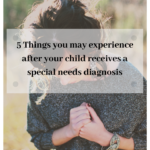Phases after your child receives a special needs diagnosis.
Now that your child has received a special needs diagnosis, you may be having feelings that were not expected. Not to worry, you are not alone in your feelings and emotions. I am sharing some phases that you may go through just as I did.

Parenting is one of the most rewarding and difficult things we do in life.
Add in the challenges of parenting a child on the spectrum or with some other special needs, it can create feelings you never expected.
Regardless of whether you are just starting your journey or you have been on it for a while, it is important to realize that there are some stages you go through.
My story
If you don’t know my story, you can read it here.
My journey began a little over a year ago, even though my son just turned 12 a few weeks ago.
Our battle to get the appropriate testing began when he was in preschool.
We received a few different diagnosis but not the one I felt he had, not until last summer.
August of 2018, we received the Autism Spectrum diagnosis, which I knew in my heart of hearts all along.
Even though I knew it in my heart, when I received the complete diagnosis in detailed writing it brought about some things I did not expect.
Once I began reading more about Autism Spectrum Disorder I realized that I was not alone in the things I was feeling.
Here are a few things you may experience once the diagnosis is given.
Stages after receiving a diagnosis
- shock and disbelief
- denial
- anger
- confusion/powerlessness
- depression
These are the stages most parents go through after receiving a diagnosis regardless of the disability.
I have been through them and it can be quite difficult to work through without some assistance.
Preparing yourself for what lies ahead can be daunting.
The journey ahead is an unknown one and we often don’t know what to do first.

Shock and disbelief
After years of feeling in my heart that my son was on the spectrum, when I heard the official diagnosis I was a bit numb.
I was definitely in shock when talking with the neuropsychologist and not sure that I even heard all she was saying at the time.
Even though she was confirming what I already knew, somehow seeing it and hearing it shocked me.
Feeling shock and disbelief is totally normal, it is a great idea to read over the complete diagnosis, several times if needed.
Be sure to go back and ask questions that you have and don’t hold your emotions in.
Talk with your family and friends to let them know what you are going through when you are ready.
Getting a diagnosis is a very emotional situation and letting your emotions show is part of the process in working through the different stages.
Denial
Some parents may go through a denial period where they feel that there has been a mistake in diagnosis, even though they know in their hearts the diagnosis is correct.
If you are feeling denial, it would be a good idea to talk in depth with the physician that gave the diagnosis and voice your thoughts.
Experiencing denial is a perfectly normal stage that you must work through in order to be able to advocate for your child.
Though there are no cures for children with special needs, there are services that can assist you both through the many phases of their diagnosis and your acceptance.
Anger
Don’t be ashamed if you are feeling angry and wondering why you have a child with special needs.
This is a normal feeling that parents need to work through. Being angry will not change the diagnosis or help you or your child.
The important thing to remember is that you are not the first parent to feel anger about the situation and to find a way to work through it.
If you are having a hard time working through the anger phase, it may be necessary for you to reach out for some counseling or a support group in your area.
Talking with others who are in the same stage as you can be very helpful.
You do not want to take that anger out on your child or those that are trying to help you through this.
Confusion and powerlessness
Receiving the initial diagnosis and learning what you have to do for your particular child’s situation can be overwhelming and bring about confusion and powerlessness.
You are entering into a journey that you know nothing about or where to begin, it will be easy to get confused about what is necessary.
Not knowing will make you feel as though you have no power in the situation.
The only way to regain your power and feel you have some control is to educate yourself .
Knowledge creates a sense of power.
Educating yourself on your child’s specific diagnosis will help you feel confident in your ability to parent your child.
Having knowledge will also help you in finding what you need for your child.
This phase will be ongoing and every changing as your child grows and new things arise.
Being on this journey is not an easy one and is often a very lonely one, bringing about depression if you are not taking care of yourself.
Depression
Depression is a natural effect of such a diagnosis and life with a special needs child.
Everything may seem overly difficult, exhausting and stressful.
You may be thinking this is not the life you had dreamed of for yourself, your family or your child.
It is so important to not feel guilty about those feelings and questions but to know that you will get through this and find joy in the every day chaos.
Easier said than done sometime, trust me I know all to well.
Ask for help when needed. This is something that I have always struggled with, but know how important it is.
There are so many things you go through emotionally and mentally once your child receives a special needs diagnosis, this only touches on a few.
I just want you to know that you are an awesome parent even on the worst of days, you are not alone in this journey and your child knows you love them without a doubt.
Remind yourself of this daily.
I want to leave with this devotion that I heard at work the other day and it really hit home with me.
This is from Sarah Young, Jesus Always Devotion
October 20
“When the task before you looks daunting, refuse to be intimidated. Discipline your thinking to view the challenge as a privilege rather than a burdensome duty. Make the effort to replace your “I have to” mentality with an “I get to” approach. This will make all the difference in your perspective – transforming drudgery into delight. This is not a magic trick; the work still has to be done. But the change in your viewpoint can help you face the challenging chore joyfully and confidently.
There is no doubt that the journey will be long and bumpy but I look forward to encouraging each other along this journey.
Till next time
Xoxo
Sonya


Sonya, there is so much great information in this post! And it applies to anyone who receives news that a loved one has a health issue. I recall feeling these emotions when my mom was diagnosed with cancer. That was great advice to seek counseling or a support group. Counseling definitely helped me cope with my feelings so I could be there to help my mom. I admire your strength and courage to share your story. You will no doubt help others who are walking a similar path. It really helps to know you’re not alone. Thank you for sharing this important message.
Rebecca, thank you so much and you are right these are feelings you experience even with a diagnosis of cancer. It is not the easiest thing to share but I do feel it is important.
It must be so hard to get a diagnosis, even if it is one that you suspect.
Hi Paula even when you suspect a special need it is still quite difficult to process. At least once a diagnosis is given you can move onto to the next phase and get some help.